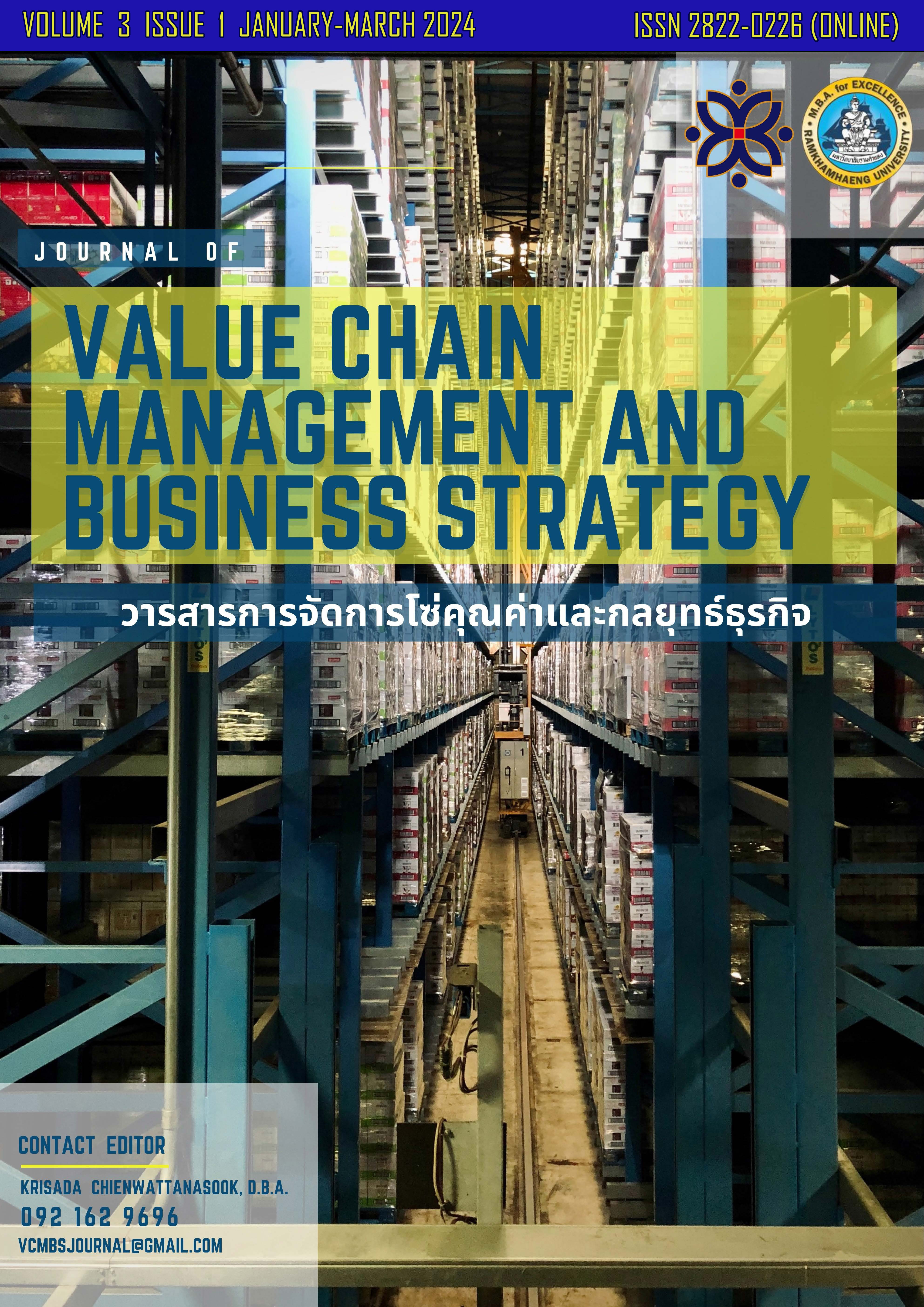THE RELATIONSHIP BETWEEN LEADERSHIP OF EXECUTIVES AND QUALITY PERFORMANCE OF STAFF IN THE THAILAND EXCISE DEPARTMENT
Keywords:
Leadership, Work Performance, Thailand Excise DepartmentAbstract
The purpose of this study is to examine the personal factors that affect the quality performance of Thai Excise Department staff and to examine the leadership of executives that affect the quality performance of Thai Excise Department staff. The sample used in this study consists of 400 staff of the Thai Excise Department who were randomly selected, and the data were collected using questionnaires. The data was analyzed using frequency, percentage, mean, standard deviation and hypothesis tests such as t-test, one-way ANOVA and Pearson product-moment correlation.
It was found that personal factors such as gender, age and status have an impact on the quality performance of the employees of the Thai Excise Department at .05 level of statistical significance. The executive’s leadership, such as being a role model in practice, creating a shared vision, challenging work processes, delegating authority to others and motivating employees, are significantly related to the quality performance of the staff of the Thai Excise Department at a statistical significance level of .05.
References
กรมสรรพสามิต. (2564). บทสรุปผู้บริหารแผนการพัฒนาดิจิทัลของกรมสรรพสามิต. https://www.excise.go.th/cs/groups/public/documents/document/dwnt/ndgw/~edisp/uatucm480462.pdf
กรมสรรพสามิต. (2566). ประวัติความเป็นมาของกรมสรรพสามิต. https://www.excise.go.th/excise2017/ABOUT_US/HISTORY/index.htm
กรมสรรพสามิต. (2566). วิสัยทัศน์ พันธกิจ ยุทธศาสตร์กรมสรรพสามิต. https://www.excise.go.th/excise2017/ABOUT_US/VISION/index.htm
จุรีวรรณ จันพลา และหทัยกานต์ กุลวชิราวรรณ์. (2565). ปัจจัยที่ส่งผลต่อประสิทธิผลการทำงานที่บ้านของพนักงานในจังหวัดนครปฐมในช่วงวิกฤตโควิด-19. วารสารมนุษยศาสตร์และสังคมศาสตร์ มหาวิทยาลัยนครพนม, 12(3), 44-61.
ธีรวัฒน์ วงศ์วรัญญู. (2563). ผลกระทบของระบบอุปถัมภ์ในหน่วยงานราชการต่อการปฏิบัติหน้าที่ของข้าราชการในจังหวัดเลย. วารสารวิจัยและพัฒนา มหาวิทยาลัยราชภัฏเลย, 15(54), 65-75.
นฤมล เพ็ญสิริวรรณ. (2561). ภาวะผู้กับการพัฒนาองค์กรให้มีประสิทธิภาพสูงสุด. วารสาร มจร มนุษยศาสตร์ปริทรรศน์, 4(2), 117-125.
ประทีป แสงแพร, ทองฟู ศิริวงศ์ และสมพล ทุ่งหว้า. (2562). ภาวะผู้นำมีความสัมพันธ์กับประสิทธิภาพในการทำงานของพนักงาน กรณีศึกษาธนาคารพาณิชย์ไทยแห่งหนึ่งในเขตสาทร. วารสารนักบริหาร, 10(2), 66-83.
ภักดี มะนะเวศ. (2563). ปัจจัยส่วนบุคคล ความผูกพันต่อองค์กร และประสิทธิภาพการทำงานขององค์กร. วารสารปาริชาต มหาวิทยาลัยทักษิณ, 33(1), 17-28.
สถิติบุคลากรกรมสรรพสามิต. (2565). จำนวนบุคลากรกรมสรรพสามิต. https://www.excise.go.th/hrm/HR_REPORT/STATIC_HR/index.htm
สำนักงานคณะกรรมการข้าราชการพลเรือน. (2566). ระบบบริหารราชการของราชอาณาจักรไทย. https://www.ocsc.go.th/sites/default/files/document/thailand.pdf
Avolio, B. J., & Gardner, W. L. (2018). Authentic leadership development: Getting to the root of positive forms of leadership. The Leadership Quarterly, 29(3), 316-336.
Avolio, B. J., Gardner, W. L., Walumbwa, F. O., & Reichard, R. J. (2009). Authentic leadership: A review of the literature and research agenda. The Leadership Quarterly, 20(3), 427-448.
Bass, B. M. (2010). Transformational leadership: An overview. In J. R. Meindl & C. Stubbart (Eds.), The Oxford handbook of leadership (pp. 171-197). Oxford University Press.
Bass, B. M., & Riggio, R. E. (2012). Transformational leadership. Psychology Press.
Blanchard, K. (2016). Situational leadership theory. In S. R. Clegg, C. Hardy, T. B. Lawrence, & W. R. Nord (Eds.), The SAGE handbook of leadership (2nd ed.). SAGE Publications Ltd.
Cherry, K. (2021). Behavioral theories of leadership. Verywell Mind. https://www.verywellmind.com/leadership-behavioral-theories-2795316
Coltman, E. (2019). Why leadership matters in business management. Forbes.
Hsieh, J.-C., & Phakthongsuk, S. (2019). Leadership and Organizational Performance: A Study of Large Corporations in the United States. Journal of Leadership, Accountability and Ethics, 16(2), 60–71.
Hunt, S. (2018). Incentives, Motivation and Workplace Performance: Research & Best Practices. Strategic HR Review, 17(5), 221-226.
Judge, T. A., & Piccolo, R. F. (2012). Transformational and transactional leadership: A meta-analytic test of their relative validity. Journal of Applied Psychology, 97(3), 546-556.
Kouzes, J. M., & Posner, B. Z. (1987). The leadership challenge: How to get extraordinary things done in organizations. Jossey-Bass.
Northouse, P. G. (2012). Leadership: Theory and practice. Sage.
Northouse, P. G. (2018). Trait theory of leadership. In Leadership: Theory and practice (8th ed.). SAGE Publications, Inc.
Peterson, J. B., & Plowman, D. A. (2003). Performance outcomes and their antecedents in the service organization: The case of the contingent workforce. Journal of Management, 29(5), 607-628.
Peterson, J. B., & Plowman, D. A. (2009). Macro and micro level tensions in performance measurement. Organization Studies, 30(1), 117-141.
Robbins, S. P., & Coulter, M. (2017). Management (13th ed.). Pearson.
Rodríguez Escudero, A. I., & Ficapal-Cusí, P. (2019). Human Resources Management: The Importance of Knowledge Transfer. Journal of Knowledge Management, 23(3), 522–536.
Saxena, R. P. (2013). The importance of leadership in management. Journal of Contemporary Research in Management, 8(2), 49-53.
Treviño, L. K., Weaver, G. R., & Gibson, D. G. (2017). Ethical leadership. Routledge.
Yamane, T. (1973). Statistics an introductory analysis (3rd ed.). Harper and Row.
Downloads
Published
How to Cite
Issue
Section
License
Copyright (c) 2024 Journal of Value Chain Management and Business Strategy

This work is licensed under a Creative Commons Attribution-NonCommercial-NoDerivatives 4.0 International License.




